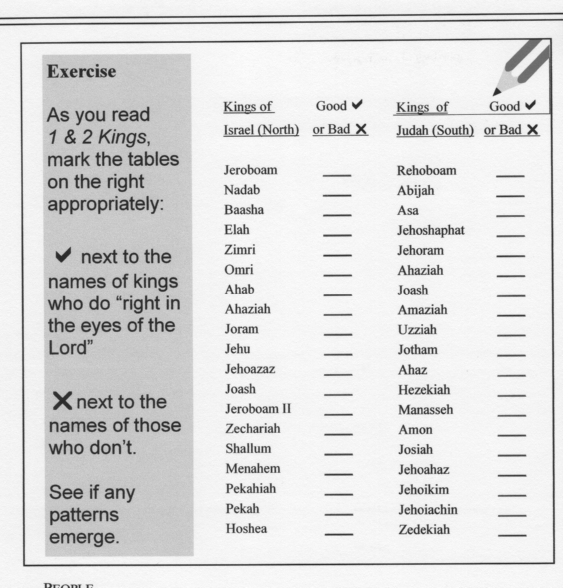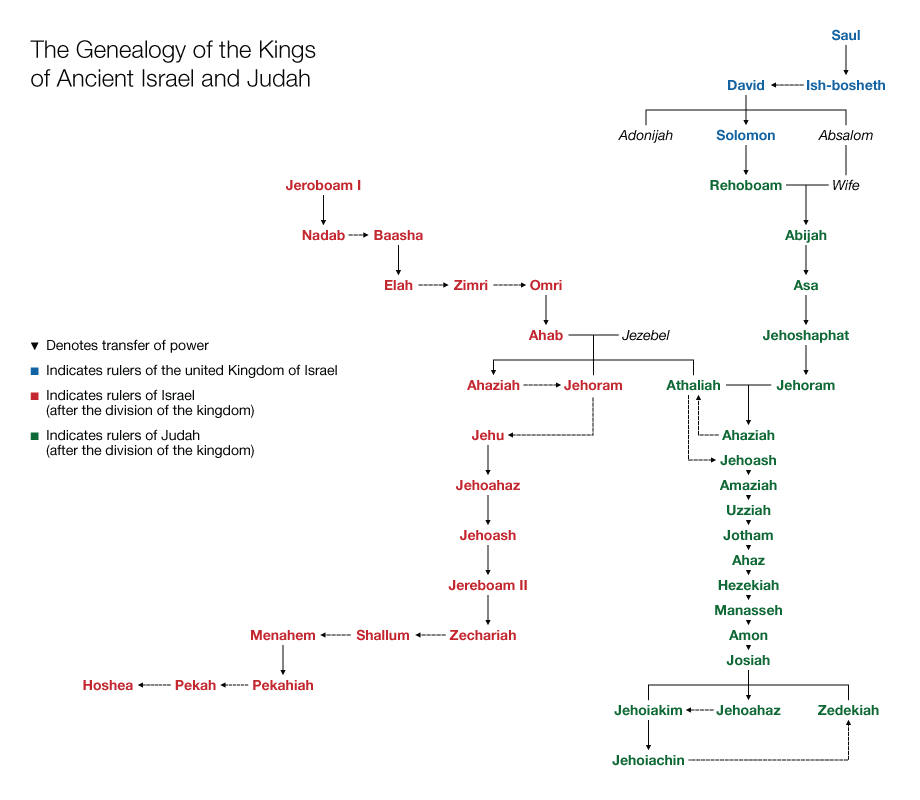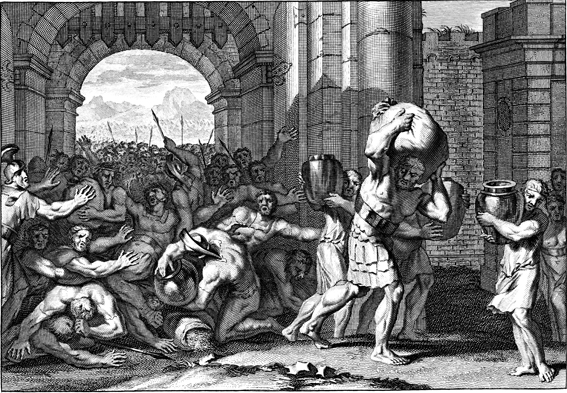 |
| courtesy www.stevethomason.net |
J5-Jehoram
Jehoram was 32 years old when became king, reigned 8 years--Jehoshaphats' son, married Athiliah, Ahab's daughter. Did evil. Judah lost control over Edom and also Libnah during this period, and they gained their independence. Jehoram tried to fight Edom but his men fled.
According to Chronicles, he led his people into pagan worship again after his father had made some positive progress away from this. He also killed his brothers. Elijah wrote a letter to him prophesying his doom and death from intestinal disease.
It also comments that the Lord stirred up the Philistines and Arabs during his reign. They attacked his royal palace and looted it, including the capture of his wife and sons. Only Ahaziah was spared. The Chronicler's comment: "no one was sorry when he died."
 |
from Constable's Notes
courtesy of Sonic Light |
I8 Ahaziah
Ahaziah fell through lattice in his upper chamber and was sick/injured. He inquired of a pagan prophet of Baal to see if he would live. Elijah rebukes him for this. So Ahaziah died and had no son to take his place. The throne reverted to his brother Jehoram.
I9 Joram/Jehoram
Joram reigned over Israel for five years before the other Jehoram began his reign. Son of Ahab, brother of Ahaziah.
I10 Jehu
Jehu was anointed by Elisha per God's direction. He was a commander under Ahab. Elisha was told to find him, anoint him, then open the door and run! Elisha went to Ramoth Gilead and found Jehu sitting with other army officers. He pulled him away to talk privately and told him God's plan for him. When he went back to the others, they pressured him to tell them what Elisha said and threw their cloaks on the ground to symbolize their allegiance.
Jehu immediately went to Ramoth-gilead where king Joram of Israel was recovering from his wounds. Ahaziah of Judah was there too visiting. They heard that Jehu was coming and sent messengers to meet him three times. Finally they both rode out to meet him, ended up meeting him at Naboth's vineyard. Jehu confronted him about the wickedness of his family. Jehoram turned to flee, but Jehu got him between the shoulder blades. Per Jehu's orders, he was thrown on the plot of Naboth's land. Jehu also pursued Ahaziah of Judah, chased him and killed him.
He came to Jezreel where Jezebel was in a tower painting her eyelids in preparation for his visit. Some of her eunichs threw her out the window per Jehu's charge to them. He then went into the palace and ate and drank. Later when he thought to bury her, her bones were scattered by dogs, per prophecy. What a sad death--betrayed by her own men, scattered by dogs, but not less than she asked for.
Jehu sent a challenge to the city of Samaria where Ahab's 70 sons were being raised. The leaders feared him and sought submission--so at Jehu's request they made two piles of the sons' heads at the city gate. He also killed all Ahab's friends, adviser's, etc...perhaps over zealously??
Jehu also tricked Baal worshipers to go to the temple and then he closed the doors and set it on fire. He was executing the Lord's judgment, but wow.
 |
| From Constable's Notes for 2 Kings, courtesy of Sonic Light |
J6-Ahaziah
Ahaziah came to throne in 12th year of year of Jehoram, King of Israel, 841BC. Mother was Athaliah. He was the youngest son of Jehoram and the only one left after the marauding Arabs took the rest of the sons.
Chronicles comments after his father, Jehoram's death, Ahab's advisers led him wrong---he made an alliance with Israel to fight King Hazael.
He did evil like his grandfather Ahab & grandmother Jezebel. He was 22 and reigned for 1 year. He fought with Israel under Jehoram against King Hazael. He visited the wounded Jehoram in Jezreel, which Chronicles comments was part of his downfall. This visit was providential, as he and Jehoram went out to meet Jehu, sent by God to execute judgement on Ahab's dynasty. Jehu killed both the recovering Jehoram and Ahaziah, who fled. The comment in Chronicles is that there were no others capable of assuming the throne after him within the family.
 |
Athaliah as depicted in Anthoine Dufour's
View desfemmes celebres, c. 1505,
Dobree Museum, Nantes, France |
J7-Queen Athaliah
After seven years, Jehoiada, the high priest, organized a plot to bring Joash to the throne. He gathered 5 commanders who executed the plan, gathering men to guard him and providing them with weapons. He announced Joash and brought him forth as king, presenting him with the book of the law at the temple. Athaliah heard noise and ran to the temple to investigate. Jehoiada had her taken to the city gate and executed
She assumed throne after son, Ahaziah, was killed. Daughter of Ahab and sister of Israel's King Jehoram. As soon as she assumed the throne, she started killing off other family. Jehosheba, Joash's sister, hid him for six years. Joash was Ahaziah's infant son.

















